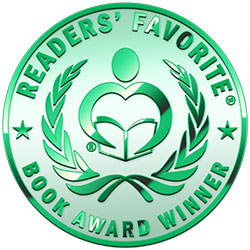
 This author participates in the Readers' Favorite Free Book Program, which is open to all readers and is completely free. The author will provide you with a free copy of their book in exchange for an honest review. You and the author will discuss what sites you will post your review to and what kind of copy of the book you would like to receive (eBook, PDF, Word, paperback, etc.). To begin, click the purple email icon to send this author a private email.
This author participates in the Readers' Favorite Free Book Program, which is open to all readers and is completely free. The author will provide you with a free copy of their book in exchange for an honest review. You and the author will discuss what sites you will post your review to and what kind of copy of the book you would like to receive (eBook, PDF, Word, paperback, etc.). To begin, click the purple email icon to send this author a private email.
![]() This author participates in the Readers' Favorite Book Review Exchange Program, which is open to all authors and is completely free. Simply put, you agree to provide an honest review an author's book in exchange for the author doing the same for you. What sites your reviews are posted on (B&N, Amazon, etc.) and whether you send digital (eBook, PDF, Word, etc.) or hard copies of your books to each other for review is up to you. To begin, click the purple email icon to send this author a private email, and be sure to describe your book or include a link to your Readers' Favorite review page or Amazon page.
This author participates in the Readers' Favorite Book Review Exchange Program, which is open to all authors and is completely free. Simply put, you agree to provide an honest review an author's book in exchange for the author doing the same for you. What sites your reviews are posted on (B&N, Amazon, etc.) and whether you send digital (eBook, PDF, Word, etc.) or hard copies of your books to each other for review is up to you. To begin, click the purple email icon to send this author a private email, and be sure to describe your book or include a link to your Readers' Favorite review page or Amazon page.
![]() This author participates in the Readers' Favorite Book Donation Program, which was created to help nonprofit and charitable organizations (schools, libraries, convalescent homes, soldier donation programs, etc.) by providing them with free books and to help authors garner more exposure for their work. This author is willing to donate free copies of their book in exchange for reviews (if circumstances allow) and the knowledge that their book is being read and enjoyed. To begin, click the purple email icon to send this author a private email. Be sure to tell the author who you are, what organization you are with, how many books you need, how they will be used, and the number of reviews, if any, you would be able to provide.
This author participates in the Readers' Favorite Book Donation Program, which was created to help nonprofit and charitable organizations (schools, libraries, convalescent homes, soldier donation programs, etc.) by providing them with free books and to help authors garner more exposure for their work. This author is willing to donate free copies of their book in exchange for reviews (if circumstances allow) and the knowledge that their book is being read and enjoyed. To begin, click the purple email icon to send this author a private email. Be sure to tell the author who you are, what organization you are with, how many books you need, how they will be used, and the number of reviews, if any, you would be able to provide.

Reviewed by Johnny Masiulewicz for Readers' Favorite
In "Promised Valley Conspiracy", the third in the innovative series, Ron Fritsch continues to chronicle the social and political turmoil of the unique prehistoric world he has created. Tensions remain high between the agrarian Valley People and the hunting-class Hill People, and whatever truces were put in place in the earlier books teeter precariously on the brink of failure as each side looks to gain an edge on the other. Dissension among the Hill People forces a detente on the part of the valley society, and they concede the upper valley to those refugees who want to work toward peace. This act leads to the rise of a threat to both peoples, a threat that can only be defeated by both sides joining together against the common enemy.
As in the other books of the series this plot line is built upon the backdrop of the unique world at the time of the dawn of mankind. Sustaining this world is Fritsch’s particular forte, and he practices it so seamlessly as to make almost necessary occasional references to period topics such as the first domestication of the horse, the invention of the wheel, and the first use of permanent housing, to remind the reader that it is indeed a period piece. These topics also add an intelligence and insight to the narrative and serve as a perfect framework on which to structure the main plot elements. Woven through these elements are themes that possess a universality that has resonated through the entire span of human existence on the planet. There is war and peace, racism and class unrest, scientific and educational developments, social cooperation and the effects on the social order when that cooperation breaks down. These themes not only subscribe to the classic literary aspects of conflict and resolution, but, through Fritsch’s deft craftsmanship, do so in a way that is pertinent even when read in the context of today’s world.